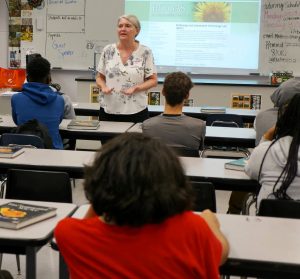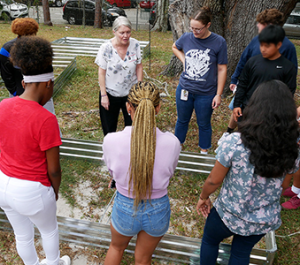Through its education outreach efforts, the UF/IFAS Department of Soil, Water, and Ecosystem Sciences (SWES) highlighted the important role students play as stewards of sustainability. Gainesville High School environmental science teacher Sadie Matteucci hosted Dr. Ann Wilkie, lead professor at the SWES BioEnergy and Sustainable Technology Laboratory, to speak to her ninth-grade students. The topic of the day? Gardening, composting, and their profound impact on our environment.
Dr. Wilkie kicked off the discussion with a question.
“How many of you – or your parents – garden at home?” she asked, which prompted a few hands to slowly rise. “And what is that you grow?”

“Tomatoes,” said one student. “Peppers,” said another.
“That’s good!” Dr. Wilkie responded enthusiastically. This set the tone for the discussion that unfolded over the course of the three classes she spoke to on October 11.
“Students play a crucial role in shaping the future of our planet. By understanding the benefits of growing your own food, they become stewards of sustainability,” Dr. Wilkie explained. Her words underscored the pivotal role students play in steering society toward more environmentally sustainable practices.
The same goes for buying locally grown food, whether it is from the grocery store or the farmers market.
“Supporting local farmers not only ensures the freshness of your produce but also reduces the carbon footprint associated with transportation,” she noted. The students listened to Dr. Wilkie’s message: the simple act of choosing local options has a global impact.
Composting: Nature’s Recycling Bin
From getting food to the plate to what happens to scraps left after a meal – Dr. Wilkie next focused on the impact of reducing food waste.
“What are some food items you don’t eat or that you leave behind?” she asked the students.
“Apple core,” shouted one, while another yelled out, “Banana peel!”
“All the leftovers on your plate that end up in the landfill produce methane, a major greenhouse gas,” she emphasized.
“I’m so glad Dr. Wilkie mentioned methane because my classes just talked about it the week before,” Sadie Matteucci said. “And her point that their food choices have a direct impact on the environment really hits home the idea that everyone has a part to play in reducing waste.”
One way to reduce the amount of food waste going to landfills is to encourage composting—an often underestimated, yet immensely powerful, practice.
“Composting is nature’s way of recycling,” Dr. Wilkie explained. “It transforms leftover food into a nutrient-rich soil amendment, reducing the need for synthetic fertilizers.”
She passed around mason jars full of composted material from her lab’s Student Compost Cooperative. There, UF students and community members can bring food scraps to make compost and then use it in their gardens.
“When students actively engage in composting, they become champions of waste upcycling,” Dr. Wilkie said. “It’s a small step with a big impact.”

Seeds of Change
Dr. Wilkie’s visit was the kick-off to a gardening project Ms. Matteucci has for her classes. Using grant funds, the school’s science department bought three raised garden beds. The discussion about gardening, composting food scraps, and using compost in the garden is designed to get the ninth-grade environmental science classes thinking about how they will tend their garden.
“Bringing in local UF experts like Dr. Wilkie enriches the learning experience,” Matteucci said. “It’s not just about textbooks. It’s about connecting with real-world scientists who inspire the next generation of environmentalists.”
Dr. Wilkie hopes her visit drives home the importance of sustainable practices and the impact of individual choices each student can make. “The students have the knowledge,” she said, “and must be active participants in the journey towards a greener, more sustainable future.” sustainability
 3
3
